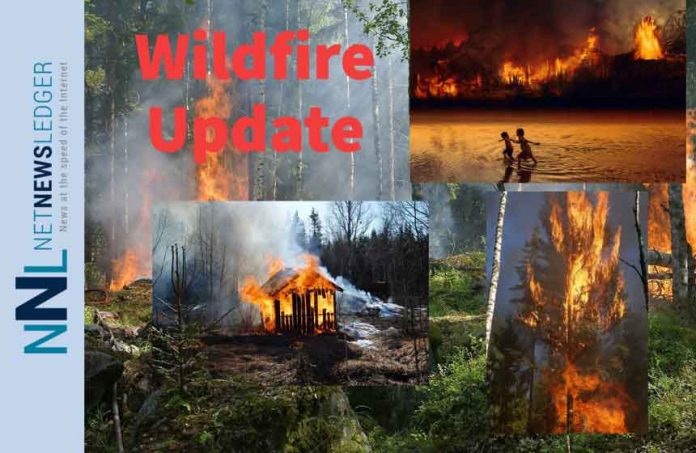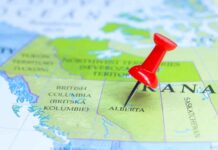EDMONTON – Hot and dry weather has ramped up the fire situation in Alberta.
Fires remain several kilometres away from evacuated communities, yet ongoing hot and dry weather may lead to more alerts in the coming days. Albertans are encouraged to download the Alberta Emergency Alert mobile app to get immediate updates.
Alberta Emergency Alerts
- As of July 21, at 2 p.m., there are three emergency alerts in effect.
- On July 20, at 12:30 p.m. the Little Red River Cree Nation expanded its evacuation order to include the communities of John D’or Prairie and Fox Lake. The nation told residents to go to the travel centre at 12 mile to register as evacuees and for help with accommodations. Residents of the nation’s Garden River community have been evacuated since July 10.
- The Municipal District of Opportunity’s evacuation order for Chipewyan Lake, issued on the night of July 18, is still in place. The municipal district arranged supports for evacuees in Wabasca.
- The evacuation alert for Janvier, as issued by the Regional Municipality of Wood Buffalo on July 17, remains in effect. This is an alert, not an order, meaning residents do not have to evacuate but should be prepared to leave on short notice.
- Javier 194, part of Chipewyan Prairie First Nation, is under evacuation as of July 18. The nation has been directing residents to Lac L Biche and Fort McMurray.
- Responses are being led by the local authorities with Alberta Emergency Management Agency (AEMA) First Nations and regional field officers on hand to provide support.
- For up-to-the-minute information, residents are encouraged to visit their local authorities’ websites and social media.
- Albertans are encouraged to download the Alberta Emergency Alert mobile app, which immediately pushes all alerts out to subscribers.
Current situation
- Approximately 7,500 people are under evacuation.
- Evacuation orders are currently in effect for:
- all three communities in the Little Red River Cree Nation, which are Garden River, John D’Or Prairie and Fox Lake;
- Chipewyan Lake; and
- Janvier 194 (Chipewyan Prairie First Nation).
- Evacuation alerts are currently in effect for:
- the Hamlet of Janvier.
- More than 150 wildfires are burning across Alberta. Priorities are being made to focus on the wildfires that are having a direct threat to human life, communities, critical infrastructure and major industrial facilities.
- Since the last report on July 20, 2024, there have been 18 new wildfires in the Forest Protection Area of Alberta.
- Semo Complex Fire (HWF061) is classified as out of control at more than 96,000 hectares in size.
- It is now approximately 2.2 kilometres from highway 58 and 13 kilometres northwest of Garden River.
- Little Red River Cree Nation remains under a state of local emergency and an evacuation order is in effect for the Garden River, John D’Or Prairie and Fox Lake communities.
- The Kettle River Complex, which includes wildfire LWF136, is located approximately 12 km north of the community of Janvier and 3 km from highway 881.
- It is estimated at 500 hectares in size and is classified as out of control.
- An evacuation order remains in effect for residents of Janvier.
- Wildfire smoke may be affecting visibility on highway 881. Visit 511 Alberta for details.
- Wildfire SWF120 is classified as out of control. It is located about 20 kilometres northwest of Chipewyan Lake and is more than 10,500 hectares in size.
- An evacuation order is in effect for Chipewyan Lake and surrounding areas.
- Since January 1, there have been 911 wildfires in the Forest Protection Area, burning more than 450,000 hectares.
- Of these wildfires, 50 are classified as out of control, 47 are being held, 57 are under control and 754 have been extinguished.
- Alberta currently has more than 1,800 personnel, 156 helicopters and 21 aircraft responding to wildfires across the province.
- In addition to provincial resources, Alberta has imported firefighters, support staff, and equipment from other jurisdictions to support wildfire response and suppression efforts.
- Firefighters and support staff from Australia will arrive in Alberta today. They will be deployed throughout the province, wherever extra help is needed.
- Although lighting has caused more than half of wildfires at the moment, the other half are caused by people. Albertans are urged to prevent any additional fire starts that will add to the already extreme wildfire situation.
- As of July 21, there are five wildfires of note in the Forest Protection Area. Information about these wildfires can be found by visiting the Alberta Wildfire Status Dashboard.
- Wildfire smoke is affecting air quality in parts of Alberta. The combination of heat and very poor air quality in smoke will increase the risk to your health. Especially when taking part in strenuous activity. Visit Wildfire Smoke Information for air quality monitoring information to make informed decisions about outdoor activities to protect your health.
- Wildfire smoke can cause a variety of symptoms or health effects that can range in severity. Milder and more common symptoms of smoke exposure include:
- headaches
- a mild cough
- production of mucus
- nose, throat, eye and sinus irritation
- In many cases, these symptoms can be managed without medical intervention.
- Applying FireSmart principles to homes and property can mitigate the risk of wildfire damage. Removing flammable materials and vegetation around the property and preventing embers from accumulating can help protect your home from wildfires. To learn more, visit FireSmart Alberta.
Fire bans
- A fire ban is in place for the entire Forest Protection Area of Alberta.
- For information on activities prohibited under this ban, visit alberta.ca/fire-bans.
- Cities, towns, villages and summer villages, as well as federal lands, such as national parks, are exempt from this ban.
- These jurisdictions have the authority to issue their own bans and may have complementary bans in place.
- Albertans should visit their local municipality’s website or social media to confirm if a fire ban is in effect in their area.
- All Albertans have a role to play in wildfire prevention. Albertans must follow all fire bans and restrictions to avoid new fire starts. If you see smoke or flames in the forest, call 310-FIRE to report it.
Support for evacuees
- Albertans in need of immediate emergency financial assistance as they leave their community can contact the Income Support Emergency Contact Centre at 1-866-644-5135.
- As of July 16, Residents of Little Red River Cree Nation, Garden River are eligible for emergency evacuation payments.
- Residents are encouraged to apply online at evacuationpayment.alberta.ca/.
- In-person applications will also be accepted in High Level at the temporary Alberta Supports Centre located at the Best Western Hotel (9616 AB-58), Monday to Friday 8:15 a.m. to 4:30 p.m.
- Evacuees who have left the area can access local Alberta Supports offices from 8:15 a.m. to 4:30 p.m. Monday to Friday, for assistance. Alberta Supports office locations are available at alberta.ca/alberta-supports.
Roads and highways
- Eastbound Highway 58 at range road 114 is closed for emergency vehicle and water hauling operations.
- Westbound Highway 58 remains open for evacuees to leave the area.
- Visit 511.alberta.ca for up-to-date information on road closures and travel advisories.
Emergency Preparedness
- Get ready for emergencies and disasters by taking simple steps now. To be prepared, Albertans need to know what to do, where to go and have enough supplies for a week or more. Supplies include food, water, medications and important documents. Include supplies for pets as well.
- Read more about emergency preparedness.








